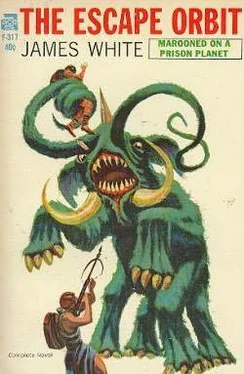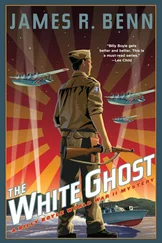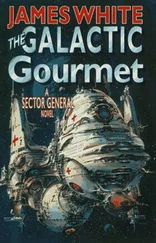James White - The Escape Orbit
Здесь есть возможность читать онлайн «James White - The Escape Orbit» весь текст электронной книги совершенно бесплатно (целиком полную версию без сокращений). В некоторых случаях можно слушать аудио, скачать через торрент в формате fb2 и присутствует краткое содержание. Город: New York, Год выпуска: 2011, Издательство: Ace Books, Жанр: Фантастика и фэнтези, на английском языке. Описание произведения, (предисловие) а так же отзывы посетителей доступны на портале библиотеки ЛибКат.
- Название:The Escape Orbit
- Автор:
- Издательство:Ace Books
- Жанр:
- Год:2011
- Город:New York
- ISBN:нет данных
- Рейтинг книги:5 / 5. Голосов: 1
-
Избранное:Добавить в избранное
- Отзывы:
-
Ваша оценка:
- 100
- 1
- 2
- 3
- 4
- 5
The Escape Orbit: краткое содержание, описание и аннотация
Предлагаем к чтению аннотацию, описание, краткое содержание или предисловие (зависит от того, что написал сам автор книги «The Escape Orbit»). Если вы не нашли необходимую информацию о книге — напишите в комментариях, мы постараемся отыскать её.
The Escape Orbit — читать онлайн бесплатно полную книгу (весь текст) целиком
Ниже представлен текст книги, разбитый по страницам. Система сохранения места последней прочитанной страницы, позволяет с удобством читать онлайн бесплатно книгу «The Escape Orbit», без необходимости каждый раз заново искать на чём Вы остановились. Поставьте закладку, и сможете в любой момент перейти на страницу, на которой закончили чтение.
Интервал:
Закладка:
They crept up to the recessed dock—staggered up was more like it, Warren thought—and magnetic clamps shot out and drew them in. The vast outer seal of the dock folded shut. Several years seemed to pass before pressure built up around their ship and the inner seal opened to allow a crowd of about twelve Bugs to come through. The Bugs had magnets on their feet and four of them were floating stretchers ahead of them, and except for the medics with the stretchers, all wore sidearms. But Warren got the impression that they wore them because it was regulations to do so and that most of them were present simply because nothing much ever happened on the guardship and this was a break in routine.
They didn’t know how right they were, thought Warren grimly as he banged his wedge with all his force into the bulkhead beside him.
Immediately the escape hatch of the control-room blew open, the reactor inspection panels and all the other emergency exits large enough to allow egress to a man blew also. The main lock and the cargo hatch opened, too, but it was several seconds before he could emerge, the reason being the howling gale of chlorine which rushed to fill the vacuum inside the ship. But finally the men came kicking and struggling and almost swimming out of all the exits, and Warren, because he had farther to go than the men leaving by the main lock, arrived when the melee was well under way.
The Bugs had the initial advantage of being held magnetically to the deck, which allowed them to take a steadier aim and to wreak terrible havoc among the attackers with their explosive bullets. But the advantage was short-lived because the human attackers had mass, inertia and velocity, and they retained these attributes even when they were dead. Warren narrowly avoided being hit by an officer whose head and chest were a cratered ruin and who was spinning slowly and inexorably towards the Bug who had killed him and who, apparently panic-stricken, was pumping more bullets into him in a vain attempt to halt his approach. The ghastly wreckage of the man collided with the Bug and both of them were left spinning helplessly a few feet off the deck. The Bug kept shooting wildly in all directions.
The dock airlock and the corridor beyond it seemed to be solid with struggling, kicking and spinning figures of men and Bugs, with the two stretchers twisting like a pair of fantastic mobiles in the thick of it. It was a mess, an utter shambles. Several times Warren collided violently with men or Bugs and once he felt a sudden, agonizing pain in the calf of his leg, but there was no smell of chlorine in his helmet and the pain grew duller after a few seconds. Explosive pellets flared and cross-bow bolts flickered past everywhere. He kicked past a Bug who had stopped an explosive bullet with its head and three Committee bolts with the rest of its body. He fended off a man with another bolt protruding from the front of his shattered helmet and he fought his way past the grisly remains of both species until he reached the corridor wall. A section of the ship’s plumbing ran along the wall and Warren grabbed for it and began pulling himself along it hand over hand until he was in the clear.
He stopped to catch his breath, to curse the pain in his leg which the bulky shield kept him from seeing, and to wipe away the sweat from inside his helmet with his forehead pad. The pad was already saturated so that it left foggy streaks on the glass instead of drying it clean, but Warren could see that other men in steadily increasing numbers were also getting clear. Singly and in small groups they drifted past him, heading towards Control, Communications, the main reactor or to guard the all-important prisoners section. He realized suddenly that the obstacle he had just come through had ceased to be a menace, expect possibly to navigation. The great mass of bodies still twisted and spun and rebounded off walls and each other—but lifelessly. The shooting had stopped.
He returned briefly to pluck a cross-bow from the air and take a quiver of bolts from an officer who would no longer need them. Feeling sick, Warren set off for the section of the great ship assigned to him to be searched. Five other officers had been given the same duty and he had no way of knowing how many of them were still alive; he knew only that there was very little time to find what he was looking for.
By Warren’s reckoning the assault men had about forty minutes’ air in their tanks. On the average, anyway, because the tanks, hose and valves were handmade and were therefore subject to unavoidable variations in performance—some would have more than an hour left, some considerably less. Inside either of these time limits they might succeed in taking the ship, only to die a few minutes later as their air gave out. Many would be able to make it to the prisoners’ sections where, because it involved so much time and trouble and waste of oxygen to evacuate and replenish it each time prisoners were transshipped, there was an atmosphere breathable by humans. But that would simply have meant that they were prisoners again. There would have been no way of escaping from that single bubble of oxygen in a chlorine-filled ship, and without the Bugs to work the food synthesizers they would starve.
The next Bug ship to visit the place would be confronted by a terrifying enigma. Their solution to it might very well be to drop a planet-buster on the prison world.
At the thought all the scenes of the past hour returned again in shocking, sickening detail. The bloody shambles inside the shuttle and at the dock, where weightlessness had added a slow-motion, nightmarish quality as well as tripling the casualties, and the relatively quiet and undramatic sight of dozens of men dying because their helmet seals had cracked. Self-doubt as well as self-disgust rose in him again and he had to tell himself sharply that all this had happened exactly as he had planned it—the long preparation and development work, the careful sifting of psychological types, even the casualties. The cost of the success, if it came, was high, but the price was well worth it.
Warren moved in a succession of zig-zag dives along the wide, low, brilliantly-lit corridors of the ship, looking into the rooms which opened off them and then hurrying on. The particular section of the guardship was unfamiliar in that only the main corridors had been reproduced as tunnels in Hutton’s Mountain, because no amount of psycho-stimulation of memories or peripheral images had succeeded in gaining data on the purpose or content of these rooms. Some of the corridors had not been reproduced at all.
A Bug appeared suddenly from one of them to crash softly into the wall a few yards ahead of him. Warren jerked up his cross-bow, then relaxed again as he saw the number of bolts already in the target. He kicked himself past the dead Bug and went on with his search.
There was a distinct smell of chlorine in his helmet now. Apparently the blow he’d received on the back of his leg had torn his suit, but the battledress was so tight-fitting at his legs and waist that it had taken some time and a lot of physical activity for the chlorine to begin penetrating to his helmet. As well, his suit wasn’t radiating nearly enough of his body heat. He was drowning in his own scalding sweat, his skull seemed ready to crack under the savage pounding of his headache, and the constant jumping and fending off with his legs and arms was tiring him badly. He had trouble focusing his eyes and he was rapidly slowing down. For minutes at a time he couldn’t see where he was going. He diagnosed the trouble as a combination of age, imminent heatstroke and possible oxygen starvation, and blundered on.
An unguessable time later he opened a door into a large, unlighted storeroom, the fan of brightness from the corridor illumination showing that the compartment seemed to be filled with giant bubbles. Warren began pounding out a signal with his wedge on the nearest metal wall, noting as he did so that the symptoms which had been troubling him were still present, but sharply diminished in severity.
Читать дальшеИнтервал:
Закладка:
Похожие книги на «The Escape Orbit»
Представляем Вашему вниманию похожие книги на «The Escape Orbit» списком для выбора. Мы отобрали схожую по названию и смыслу литературу в надежде предоставить читателям больше вариантов отыскать новые, интересные, ещё непрочитанные произведения.
Обсуждение, отзывы о книге «The Escape Orbit» и просто собственные мнения читателей. Оставьте ваши комментарии, напишите, что Вы думаете о произведении, его смысле или главных героях. Укажите что конкретно понравилось, а что нет, и почему Вы так считаете.












